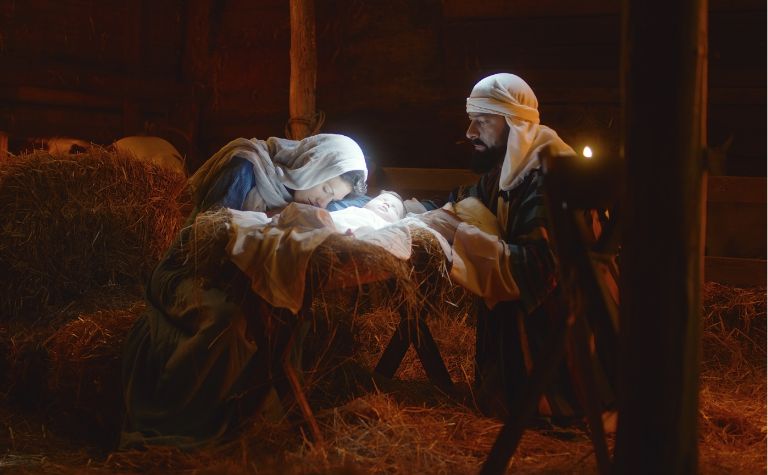The city of Bethlehem, nestled in the Judean hills, holds a special place in history and the hearts of millions worldwide.
Known predominantly as the birthplace of Jesus Christ, its significance is multifaceted, interweaving prophecy, history, and theology.
In this exploration, we journey through the reasons that make Bethlehem the chosen city for such a momentous event and how its legacy reverberates globally even today.

Prophetic Significance
Centuries before Jesus’s birth, there were hints and prophecies scattered in the scriptures suggesting where the awaited Messiah would be born.
Among these, the prophecy in Micah 5:2 stands out distinctly: “But you, Bethlehem Ephrathah, though you are small among the clans of Judah, out of you will come for me one who will be ruler over Israel, whose origins are from of old, from ancient times.”
This prophecy not only named Bethlehem as the birthplace but also established a direct link to the lineage of King David.
As a result, there grew an expectation among the Jewish people that the promised Messiah would emerge from Bethlehem.

The Census and Roman Influence
The geopolitical atmosphere of the time also played a crucial role in shaping this historic event.
The Roman Empire, which had control over the region, decreed a census during the time of Emperor Augustus.
This census required every individual to travel to their ancestral town for registration.
Joseph, betrothed to Mary, hailed from the lineage of King David.
Despite the fact that they resided in Nazareth, the requirement of the census meant that Joseph had to make the journey to Bethlehem, David’s ancient city.
This journey was significant not just for compliance with the Roman edict but also for fulfilling the ancient prophecy.
Mary, in the late stages of her pregnancy, accompanied Joseph, and it was there, in Bethlehem, that she gave birth to Jesus.

Theological Implications
Beyond the literal events leading up to Jesus’s birth, there’s a depth of symbolic significance attached to his birth in Bethlehem.
Known as the “City of David,” Bethlehem’s association with David, the shepherd boy turned king, provides a rich backdrop.
Jesus, often referred to as the “Good Shepherd” and also the promised king in David’s line, strengthens this association.
Furthermore, the name “Bethlehem” translates to “House of Bread.”
In Christian teachings, Jesus referred to himself as the “Bread of Life,” offering spiritual sustenance to all.
Though possibly coincidental, this connection adds another layer of meaning to Jesus’s birth in this particular city.
Bethlehem’s Significance Today
Modern-day Bethlehem continues to hold an essential place in the hearts of many.
Annually, thousands flock to this city, especially during Christmas, to commemorate the birth of Jesus.
The Church of the Nativity, believed to be built over the birthplace of Jesus, stands as a testament to the enduring legacy of the nativity story.
Pilgrims from across the world visit this church, looking to connect with the historical and spiritual roots of the Christian narrative.
The city itself, with its narrow streets and ancient walls, seems to whisper stories from the past, allowing visitors a glimpse into what life might have looked like two millennia ago.
The vibrant festivals, the solemn processions, and the heartfelt prayers that fill Bethlehem, especially around Christmas, continue to emphasize the city’s undiminished importance.
Historical Background of Bethlehem
Long before it became known as the birthplace of Jesus, Bethlehem had its place in history.
In the Old Testament, it’s chronicled as the birthplace of King David, one of Israel’s greatest kings.
It was on the hills of Bethlehem that young David shepherded his flock, and where he was anointed by the prophet Samuel as the future king of Israel.
Bethlehem’s significance wasn’t just royal. The city had a prominent role in the Judean region, with its fertile fields and strategic location.
Over time, as empires rose and fell, Bethlehem witnessed numerous historical events, each contributing to the tapestry of its rich history.
Cultural Impact and Celebrations Worldwide
The tale of Jesus’s birth in Bethlehem transcends the boundaries of the city and has spread far and wide, leaving a lasting impact on global culture and celebrations.
Year after year, communities around the world celebrate the birth of Jesus through varied traditions and customs, and Bethlehem remains central to these celebrations.
In many parts of the world, “Bethlehem” is more than just a name; it symbolizes hope, joy, and new beginnings.
Nativity plays, a staple in Christmas celebrations, often feature elaborate recreations of Bethlehem, transporting audiences back to that sacred moment in time.
Even Christmas carols and hymns frequently allude to the starlit night in Bethlehem when Jesus was born.
Further, craftsmen and artisans worldwide draw inspiration from the nativity story, creating intricate Bethlehem-inspired ornaments, nativity sets, and other decorative items.
These artifacts, while diverse in design and material, all echo the same sentiment of reverence and adoration.
Moreover, cities across continents have named their own communities after Bethlehem, reflecting the deep-rooted connection and significance they feel toward the original city in Judea.
This widespread cultural embrace stands as a testament to the universal appeal and enduring legacy of the story of Jesus’s birth in Bethlehem.
Conclusion
The story of why Jesus was born in Bethlehem is an intricate weave of prophecy, history, political mandates, and symbolic significance.
Whether it’s an ancient prophet’s words or a Roman emperor’s decree, each thread played a part in shaping this momentous event.
Today, as we reflect on the reasons behind Jesus’s birth in Bethlehem, we are reminded of the profound intersections of divine plans and human events.
This narrative, rooted in a small city in Judea, has left an indelible mark on history, influencing art, culture, and the collective imagination of countless generations.
Related Questions
Joseph, the husband of Mary and the earthly father of Jesus Christ, is depicted in the Gospels as humble, law-abiding, and obedient. In many Christmas scenes, such as in displays of the manger, he is...
The virgin Mary, the mother of Jesus, is one of the most fascinating people in the Bible. For 2,000 years, people of different eras and cultures have marveled at her faith in God. Mary's story in the...
